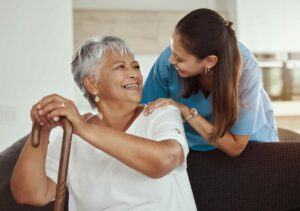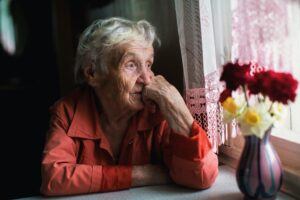Gardening has many benefits. Not only can gardening create a pleasant space to look at, it also provides a person with fresh air, sunshine, and a level of exercise and activity. While gardening consistently over time can help reduce the number of falls a senior person is likely to have,1 the activity of gardening itself can result in falls – particularly for senior people who are more prone to falls in the first instance. At Home Care Assistance, our Care Professionals use certain techniques to help reduce the risk of falls while gardening. We have put together this guide of some of those techniques that you can use in your own home, or that of a loved one, to reduce the risk of falls but allow for the benefits of gardening.
The first step to avoiding falls when gardening is to remove trip hazards. This can include uneven pathways, unclear pathways that have vegetation growing over them, and moving hoses and tools out of walkways. If there are less things to trip over, then the risk of falls is reduced.
It is also important to make sure that the garden can be easily accessed. This can be by raising garden beds where possible so that they are easier to access. Alternatively, if the garden beds are at ground level, using either rails, or tools to assist in getting back up from the ground, can help avoid falls. It is important to take your time getting up and down while gardening, so it is done safely.
Another important step is to wear appropriate footwear. Having good, supportive footwear not only protects your feet in the garden, but also helps to prevent falls by providing stability. Appropriate clothing is also important. It is easy to overheat while gardening if a person is not wearing appropriate clothing. This overheating can increase the likelihood of falls. Dehydration can also lead to falls, so it is important to drink enough water while out in the garden. Having a drink bottle on hand out in the garden can make this easier. On a really hot day, it is best to avoid gardening during the hottest part of the day, or consider gardening another day, to avoid overheating which will increase the risk of falls.
While overheating can increase the risk of falls, so can being tired. It is easy to get carried away and do more gardening than originally intended, but if you are tired you are more likely to have a fall. Taking breaks can help with this, as can splitting the gardening tasks over a series of days rather than doing it all in one hit.
Finally, it is important to know your limits regarding what you can physically do. For instance, carrying objects that are too heavy, or doing tasks that are too physically demanding can result in falls and other injuries. For this reason, it is important to stick to the gardening tasks within your capabilities. For some people, getting someone in to do the heavy or more physically demanding tasks safely allows them to enjoy the benefits of doing the easier tasks, without the risks of the more difficult tasks.
While following this guide can help reduce falls when gardening, they can still happen. If you have a mobile phone or personal emergency alarm, make sure you take it with you so if you do have a fall and need help you can contact someone. If you have home care provided by a Care Professional, you may choose to garden while they are at your home so there is someone on hand.
Gardening is a great activity for senior people with many benefits, not to mention it can be quite enjoyable. However, it is important to garden safely and take steps to reduce the risk of falls. By following this guide, you can garden as safely as possible so you can get the benefits and enjoyment out of it but reduce your risk of falls.
Support of a home care agency like Home Care Assistance, can bring enormous benefit and comfort to your quality of life while living independently at home. Home Care Assistance has viable solutions when it comes to supporting independent living. For more information, get in touch with a Home Care Assistance near me today.
As a leading age care provider, Home Care Assistance offers tailored in-home care services for older Australians, enabling them to live happier and healthier lives in the comfort of their own homes.
We offer private and government subsidised Care Packages and have office locations that are a registered NDIS provider. Our Care Workers undergo extensive training in order to deliver unmatched in-home aged care services where people can continue ageing in place. We are proud ambassadors of the My Aged Care government funded aged care program, enabling Australians to successfully navigate the process and gain approval for in-home care support packages. Home Care Assistance offers hourly care, specialised care, Alzheimer’s and Dementia care, hospital to home care, and 24 hour in home care.













